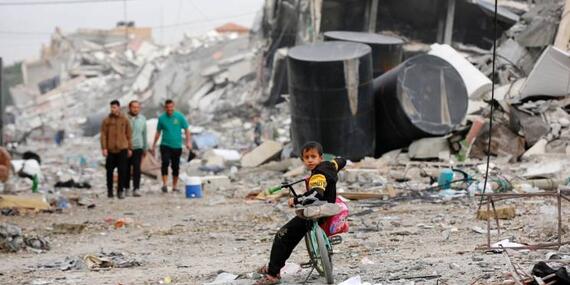Today's top news: Occupied Palestinian Territory, Central Emergency Response Fund

Occupied Palestinian Territory
The Under-Secretary-General for Humanitarian Affairs, Martin Griffiths, told journalists in Geneva today that the pace of the military assault in southern Gaza is a repeat of the assault in northern Gaza. He said it has made no place safe for civilians in southern Gaza, leaving the humanitarian plan in tatters.
The World Food Programme (WFP) warns that hunger is spreading widely in Gaza, and people are growing increasingly desperate trying to find food to feed their families. Cases of dehydration and malnutrition are rapidly increasing.
Recent WFP phone-based monitoring shows that between 83 and 97 per cent of families are not consuming adequate amounts of food, and in some areas as many as 90 per cent of households report spending a full day and night without any food, some for as many as 10 days in the last month.
OCHA reports that most patients and staff in the Kamal Adwan hospital in Jabalia were evacuated yesterday by the Ministry of Health in Gaza, and the hospital largely stopped functioning and ceased admitting new patients. This is due to the intense fighting in its vicinity, compounded by the lack of basic medical supplies, water, food and fuel.
Currently, only 14 out of 36 hospitals in the Gaza Strip are functional, and even then only provide limited services. Among them, two small hospitals in the north and 12 in the south are reported to be able to admit new patients.
Eighty trucks carrying humanitarian supplies and 69,000 litres of fuel entered from Egypt into Gaza yesterday. This is well below the daily average of 170 trucks and 110,000 litres of fuel that had entered during the humanitarian pause implemented between 24 and 30 November, and the average of 500 truckloads, including fuel, that entered every working day prior to 7 October.
The UN’s ability to receive incoming loads of aid has been significantly impaired over the past few days by several factors. These include a shortage of trucks within Gaza, with some being stranded in the Middle Area, which has been cut off from the south; telecommunications blackouts; and the increasing number of staff who were unable to report to the Rafah crossing due to the hostilities.
Central Emergency Response Fund
At yesterday’s High-Level Pledging Event for the Central Emergency Response Fund (CERF), 40 donors announced contributions of more than US$419 million for the Fund in 2024. This exceeds the $409 million pledged at last year’s event.
So far this year, CERF has allocated more than $640 million to support millions of people who need urgent assistance in some 40 countries and territories. This included kick-starting aid operations in Gaza and Sudan, as well as swiftly responding to devastating earthquakes in Türkiye and Syria.
This year, once again, CERF has proven that it is truly a Fund “for all, by all,” said Under-Secretary-General for Humanitarian Affairs Martin Griffiths, speaking during the event. He added that CERF needs to continue to play such a critical role, if it is fully funded.
Most recently, Mr. Griffiths allocated $4 million from the Fund to Madagascar and $5 million to Zimbabwe to take action ahead of droughts triggered by El Niño. In Zimbabwe, the resources will also be used to respond to a cholera outbreak.
